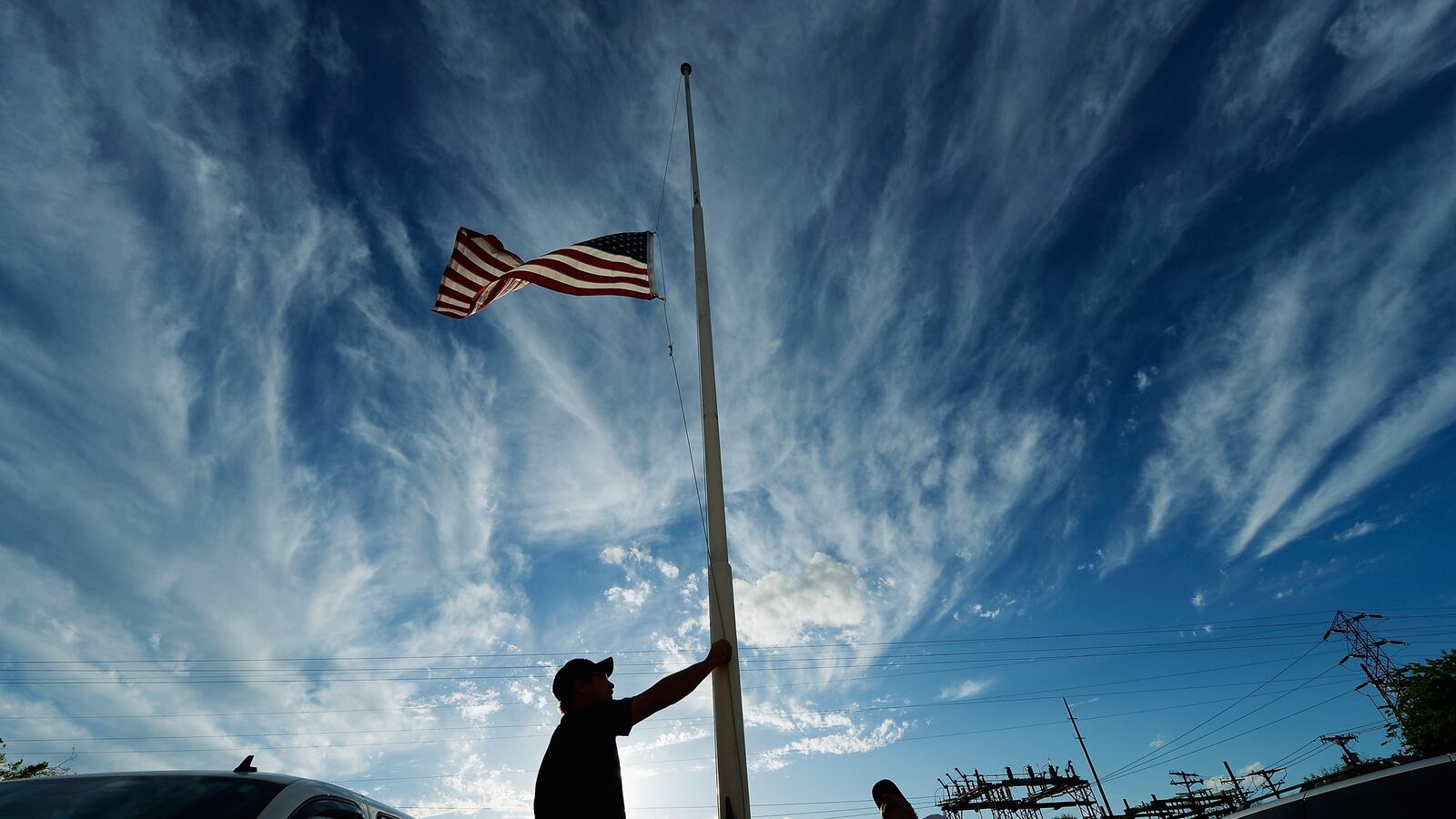WEST, TEXAS—Long before a seismic explosion at the local fertilizer plant leveled dozens of homes and killed 14 people, including nine first responders, many residents of this small traditional Czech community felt as if they were living next to a ticking time bomb.

“Everybody has thought about it for years,” says Gary Horton, who lost his home in last week’s blast. “It’s always been a possibility. We talked about people making bombs in Oklahoma City, but there was a big bomb right across the street. It don’t take nothin’ but a spark.”
So on Friday night, as hundreds gathered at St. Mary’s Church of the Assumption for a prayer service honoring those who lost their lives at the West Fertilizer Co., the people of this town, 20 miles south of Waco and known for its stuffed kolache rolls and annual polka festival, traded stories of heroism and resilience—but rarely shock.
Daniel McGruder was hanging out with a neighbor Wednesday night when they were shaken from their chairs by the boom. The house shook so fiercely, he says, that it knocked the television off the wall. He instinctively knew it was coming from the 50-year-old fertilizer plant and ammonia storage facility a few blocks away. He ran outside witnessing what he later described as a “giant black mushroom cloud.”
Worried for his cousin, a volunteer firefighter who also worked at the nearby nursing home, McGruder immediately got in his truck and started driving toward the site. By the time he arrived, the one-story West Rest Haven had already collapsed into rubble.
“There were people still stuck in their beds,” he says. “I saw a lot of head injuries. There was blood everywhere. Eardrums were blown out. It was like a horror movie. The elderly patients had glass on them, and they were still in their beds.”
Patients and employees were dazed, crying, and moaning, he said. He saw a young female nursing-home worker, blood pouring from a head wound, trying to pull people from the debris before she was taken away to the hospital. McGruder, a Texas native and the father of two teens, joined the first responders loading the elderly into pickup trucks. “We loaded 15 to 20 patients in wheelchairs,” he said. “It’s something I will never forget in my life.”
He tried to help pull people out of the crumpled 25-unit apartment complex next door, but couldn’t continue. “I was too afraid to go in,” he said. “I couldn’t handle it anymore. I didn’t want to see any bodies.”
Fortunately, McGruder’s cousin narrowly escaped the blast with his life. “He broke his leg, right arm, and four fingers,” he says. But the explosion claimed the lives of five of the town’s 33 volunteer firefighters, most of whom worked day jobs as farmers, car salesman, city employees, and business owners. More than 160 people were injured.

As federal and state investigators try to determine what caused the blast, questions are swirling about the safety of the plant. It has recently come out that the U.S. Environmental Protection Agency had fined the facility $2,300 because of deficiencies in its risk-management plan, and the U.S. Occupational Safety and Health Administration had not inspected the family-run plant, which contained 24,000 gallons of anhydrous ammonia and ammonium nitrate—the key ingredient used to make the bomb that tore apart the Murrah federal building in Oklahoma City—since 1985. More recently, in 2006, the Texas Commission on Environmental Quality cited the plant for failing to obtain a permit. The plant was checked out only when the state agency received a complaint about a strong ammonia smell. Reuters reported that in 2012 the plant had stored 1,350 times the amount of ammonium nitrate that would have normally triggered safety oversight by the U.S. Department of Homeland Security.
And, this year, a fire at the plant caused city officials to evacuate nearby West Intermediate School. It turned out the fire was a controlled burn of brush on the property.
Many locals like McGruder are left wondering why the plant was located in such close proximity to homes, apartments, a nursing home, and at least two schools in the first place. “It was too close,” says McGruder, 45, whose two children attend the local high school that was damaged after the blast. “Why build schools there? They knew that school shouldn’t have been there. There is so much pain in this town.”
When the plant was built in 1962, it was mostly surrounded by fields and a few small homes. But that began to change as the town grew up around it. The nursing home and the 25-unit apartment complex were constructed in the ’60s and late ’70s and were located within 150 yards of the plant. Subdivisions and homes began being built in the 1980s. The plant’s current owner, Donald Adair, bought it in 2004.
“Fifty years ago, it was just good business,” says Mimi Montgomery Irwin, a local historian and owner of the Village Bakery downtown. “People needed jobs, and someone needed to sell the property. It made sense for the time. We are on the hub of a farm region. You need a business like that to support the farming. Maybe they will be smarter about it now, but the business entity itself is needed.”
Joe Kotch, 71, says he moved to West one year after the plant was built. “They extended the town out,” he says as he drinks a coffee at the bakery, located near the train tracks that go through the town and bring chemicals to the plant. It was a bad idea, he said, but people became comfortable with it.
“It was always a bad idea to build around it, but no one thought it would ever happen,” he said. “I’ve been here for 50 years, and nothing has happened.” Kotch says the plant should be rebuilt outside of town. “It happened one time, it could happen again,” he says. “I think they should rebuild on [the owner’s] farming land.”
In keeping with the town’s stoicism, few residents expressed anger toward the plant’s management. Horton, who lost his home, says he doesn’t harbor any bad feelings toward the owners, who like him grew up in the city of West. “I know they didn’t do it intentionally,” he said. “I’ve grown up with those people. They’re good people. It’s an accident—I’m not going to file a lawsuit against them. As long as my insurance covers it, I’m all right.”
But that doesn’t mean they’re not shaken. Outside the church service Friday night, Annette Cook stood with her daughters trying to make sense of what happened. “It’s horrible,” she said. “Everyone here knows everybody. I know all the people who died. I knew that plant. It was really big for farmers.”
Cook runs the therapy department in a nursing home in nearby Hillsboro, which received close to a dozen elderly residents from West. “A few passed away from the commotion,” she says. Others, she said, “still had blood on their clothing” when they were brought to her facility the next day.
“They’re afraid it’s going to happen again. They don’t know where their roommates and friends are.”
Cook says when she heard about the blast, her first thoughts went towards a terrorist act. “I thought, God, someone hit us,” she says. “I thought, we are next. All the kids see is all this hate in the world. They all thought they would be next. You have to think of the kids here in West. This is all they know.”
Cook says she is mostly thankful that the blast happened at 8 p.m. and not during the day, when the kids were in school. “If it blew up earlier, kids would have been killed,” she says. “The kids would have been right in the middle of everything.”





